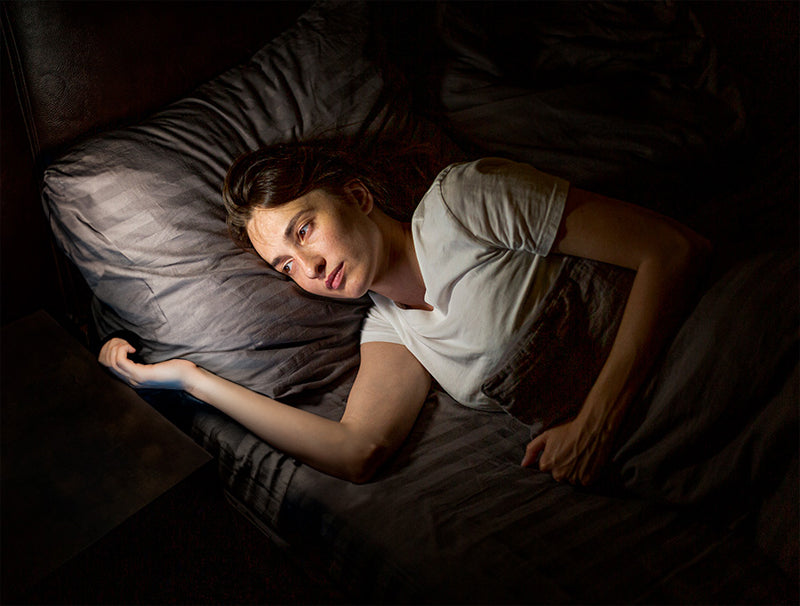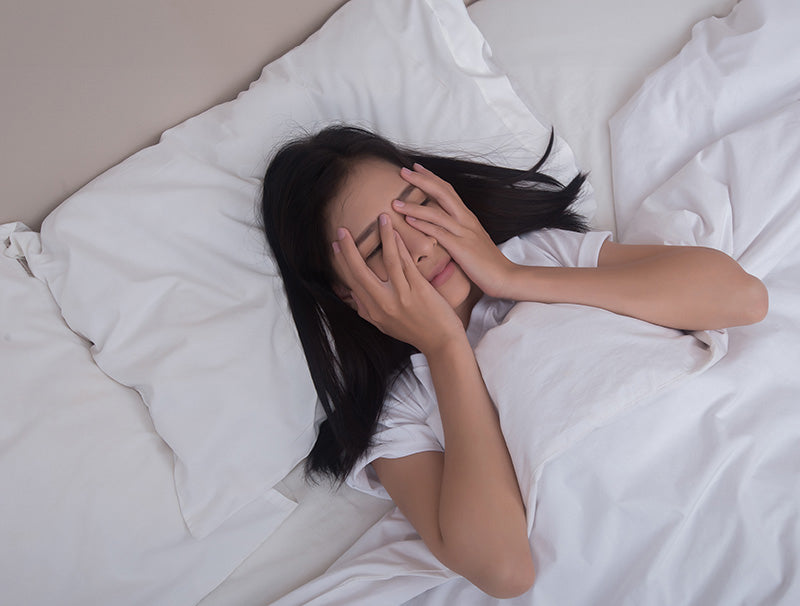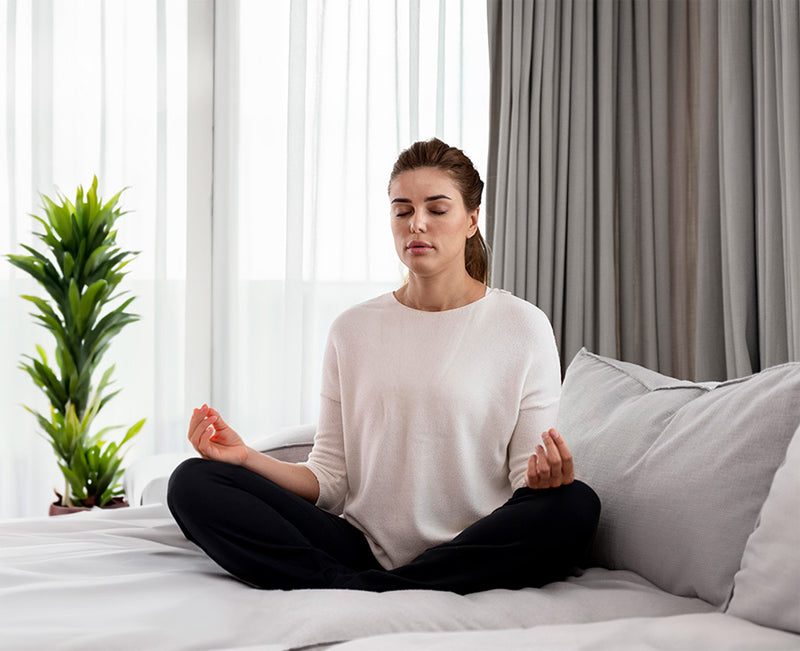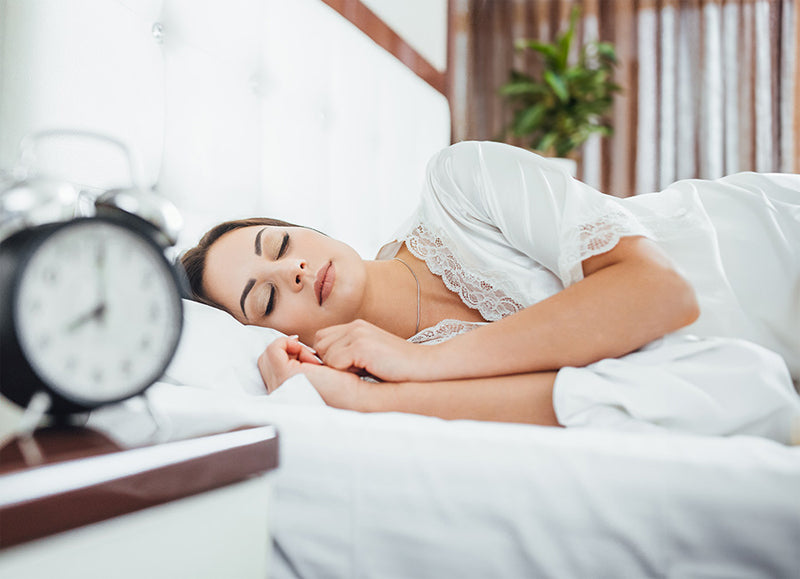No Products in the Cart
Ashima Yadav, a psychology student at Christ University, India, seamlessly combines academic pursuits with freelance content writing. Read more
Last Updated September 20, 2024
 Fact checked by Marwa Ismail
Fact checked by Marwa Ismail
Marwa Ismail is a nationally board-certified health coach who graduated from The Institute of Integrative Nutrition and holds a certificate in Functional Nutrition Coaching from MindBodyGreen. With a bachelor's degree in Psychology from UNC-Charlotte, she runs Figs and Olives Wellness, assisting clients in achieving health goals through lifestyle and nutrition changes. Marwa also works remotely for the Minneapolis Integrative Medicine Center. Read more
You had a very exhausting day at work, and now all you want is some good sleep, yet you’re lying wide awake in the middle of the night, tossing and turning around in your bed, trying to fall asleep, but nothing is working. If that’s you, you have to come to the right place!
We all love sleep, yet many of us struggle to get enough sleep. Around 39% of Americans have trouble falling asleep or staying asleep. If you’re one of those 39%, don’t worry. We have got you covered; here’s all you need to know about what to do when you can't sleep.

Key Takeaways:
Whether you have trouble sleeping from time to time or regularly, various reasons could contribute to your sleeplessness. Getting to the root of your sleep issues can help you find a more appropriate solution. Continue reading to learn the reasons for your sleep troubles, solutions, and when to see a healthcare provider.

If you have a racing mind or experience a lot of stress during the day, then that’s probably the reason behind your sleep issues. Worrying about your relationships, job, or whatever you have on your mind can disrupt sleep and affect your sleep quality.
Sleep disorders like sleep apnea, restless leg syndrome, etc., can cause difficulty falling asleep. Some sleep disorders affect the ability to fall asleep, while others affect sleep quality.
If you’re suffering from any physical health condition, then that could also be the reason for your sleepless nights. Illnesses like fibromyalgia can cause difficulties falling asleep, while something like kidney disease might wake you up several times at night.
Certain kinds of medicines cause side effects that might disrupt your sleep. Medicines might cause excitability, lower melatonin levels, or cause anxiety, leading to sleeplessness. There are some medicines, like antidepressants, that might also directly cause chronic insomnia.
Consumption of caffeine during the day is fine; however, if consumed close to your sleep time, it can interfere with your sleep. Caffeine works by seeking out adenosine receptors and tricking our brain into thinking that sleep time is still far away. However, the effects of caffeine can last for up to 5 to 6 hours, so if consumed around that time, it can keep you wide awake.
It is necessary for the sleep environment to be conducive to sleep. If you have too much blue light exposure or the bedding (pillow and mattress) is uncomfortable, it might cause difficulty falling asleep. Even if the room is too hot, it might cause discomfort. It is essential to have an optimal sleep environment for a good night’s rest.
What you do during the day and right before sleeping can also affect your ability to fall asleep. Things like napping late in the evening or having a passive lifestyle might negatively affect your sleep. Eating heavy meals late at night can also affect your good night’s rest.
Jet lag happens when your circadian rhythm, the body’s 24-hour sleep-wake cycle, is not in alignment with a new time zone. This can temporarily cause trouble falling asleep and cause daytime sleepiness.
Whatever the cause of your sleeping trouble may be, the good news is that it can be treated or at least improved by following various bedtime habits, making changes in your sleep environment, or doing some relaxation techniques.
There are various muscle relaxation and breathing techniques that can aid you in sleeping faster and better. These techniques help one relax their body and mind, which helps the body be at ease and gently fall asleep.

Slow, deep breathing can relax the nervous system and help you fall asleep quickly. Moreover, it is also said to help produce melatonin, which is an essential sleep-inducing and naturally occurring hormone. Various breathing techniques can help you in putting yourself to sleep.
This is perhaps one of the simplest and easiest breathing techniques. All you have to do is lie down in a comfortable position and take slow, deep breaths. Inhale slowly and gently with your nose, exhale gently with your mouth, and count the breaths. You can either count each breath or each cycle of breathing in and out.
Bud Winter (an American track and field coach) developed this technique during the Second World War to help the U.S. Navy Pre-Flight School pilots fall asleep in under 120 seconds, hence the name Military Method. This method includes taking a deep breath and relaxing your facial muscles, including your mouth. Then, work your way down to your shoulders and arms, drop your shoulders, and sink into the bed. Slowly move your way down, focus on one part at a time, and relax them all.
Once you’re done relaxing every part of your body, focus on clearing your mind. You can clear your mind by visualizing a calming scenario. For instance, imagine yourself lying under a shady tree under a clear sky, or whatever helps you feel calm. If this doesn’t work, repeat the words “don’t think” to yourself for 10 seconds. These 10 seconds should help you fall asleep easily. This method takes a little bit of practice, but once mastered, this technique can be life-changing.
This breathing method was developed by Dr. Andrew Weil and is based on pranayama exercises. To begin this, first place the tip of your tongue against the roof of your mouth, behind the front two teeth. The position of the tongue remains the same during the entire procedure.
Now, inhale through your nose while counting to 4. Hold this breath and count up to 7. Exhale through your mouth while counting up to 8. The exhalation should create a whooshing sound because of the location of the tongue. Repeat this cycle four times; however, if your body feels sleepy before completing four cycles, let go and enjoy your sleep.
Practicing mindfulness meditation has several benefits, like reducing anxiety, managing stress, relaxation, etc. Mindfulness and meditation are not just for the yogis; they can be incorporated into our daily lives to harness their potential benefits. Mindfulness is essentially observing the present without judgment.
One way to practice mindfulness is to do a body scan. Start by taking a few deep breaths, and then let the breath return to its normal pace. Now observe your body; notice how it’s lying against the bed and what sensations you’re feeling. Make sure not to get stuck on any sensation or thought, just observe and let go.
Observe each body part and its sensation; once done with all body regions, observe the entire body. The goal is to stay present and observe without judging or reacting. You can also use this technique by observing all the sounds you can hear from your surroundings.
Progressive muscle relaxation, also known as deep muscle relaxation, is said to create a calming effect on the body by gradually tightening and releasing the muscles. This technique involves going through the entire body muscle by muscle, tightening the muscle, waiting for 5-10 seconds, and then relaxing each muscle as you go through the entire body.
You can either go from the top of your head through your face, torso, and legs all the way down to your toes, or you can go from your toes all the way up to your head. This technique helps to destress your body and relieve pain.
Visualization mainly works best for visual thinkers, who can easily imagine sceneries in detail. This method involves getting into a comfortable position and imagining a calming scene. The scene could be anything one has experienced in the past, seen in movies or something entirely from one’s imagination. Reflect on the details of the imagined scene while slowly breathing in and out. Keep adding details related to all your senses and experience the calmness of this beautiful mental image that you have created. The goal is to engage the mind in details to promote relaxation.
Sleep music helps reduce the activity of the sympathetic nervous system and relax your body. Listening to calming, soft music can help you fall asleep better. Some might prefer listening to natural sounds like rain, cricket, etc. Playing any of these in the background while sleeping can help relax your body and distract your mind, making it easier to sleep.
Good sleep hygiene practices refer to a set of habits that promote healthy, restful sleep. These sleep tips can be incorporated into your lifestyle to help you sleep better.

Going to bed and waking up at the same time every day helps in falling asleep faster and getting better quality sleep. A consistent schedule (even on weekends) can help synchronize your circadian rhythm and sleep cycle. This helps your body know when to expect sleep and helps you become better at initiating and maintaining sleep.
An active lifestyle helps reduce cortisol (stress hormone) and release endorphins. This helps reduce stress and anxiety and promotes better sleep. Moreover, physical activity can help regulate circadian rhythm and body temperature. Exercising at a consistent time every day can signal your body when it’s time to be awake and when it’s time to wind down for sleep. However, one should avoid exercising later in the evening, which might be counterproductive.
Caffeine can help you feel awake in the morning and give you energy to finish your work during the day. However, if consumed until a few hours before sleep, it can keep you awake even when you’re ready to go to bed. So limiting your caffeine consumption till mid-afternoon can help in the onset of your sleep.
Blue light has significant effects on one’s sleepiness. Studies have shown that blue light decreases the quality and duration of sleep. So, turning off all blue lights and keeping away your devices at least an hour before sleep can promote sleepiness and help your mind and body get ready to sleep.
Your bedroom environment plays a massive role in your sleep. First, your bedding, pillows, and mattress should be comfortable to promote better sleep. Then, the room should have optimal temperature (According to the National Sleep Foundation, the ideal sleep temperature is between 60 to 67 degrees Fahrenheit - as this aligns with your body's natural cooling process when preparing for rest), very dim to no lights, and be comfortable and cozy. Further, you can also have a diffuser in your room to make it smell good. Make your sleeping environment as comfortable as you can. Comfortable sleep environment will help you stay asleep.
Having a bedtime routine consisting of relaxing activities can give your body cues as to its sleep time and prepare your mind for the onset of sleep. Your bedtime routine can include any activities that you find relaxing. Some activities that can help you wind down are:
If you have been tossing and turning around in your bed for over 20 minutes and still can’t fall asleep, it’s time for you to get out of bed. The problem with lying awake in bed for longer is that it reinforces sleeplessness. Your mind keeps obsessing over the fact that you’re unable to sleep. In such a case, get out of bed for at least 30 minutes and do any relaxing activity. Make sure to stay away from screens and food that can result in your body and mind getting more alert. The idea is to get back to bed whenever you start feeling drowsy.
If you have trouble falling asleep regularly, sleep journaling might help. A sleep journal consists of all your records of what you do before bedtime, how long it takes you to sleep, whether you wake up at night, what you do after waking up, and so on. This record can help you see patterns in your sleep habits and figure out what’s throwing off your sleep.
If you have tried everything, and nothing seems to work, your sleep problems might be due to an underlying health condition. Or if you’re already under treatment for any health issues, those medications might interfere with your sleep. In any case, it’s best to see a doctor. Solving the underlying condition can help lessen your symptoms and help you sleep peacefully.
If you have sleepless nights regularly and none of the above-mentioned tips seem to help you, it might be time to see a sleep specialist. It can be very frustrating to be tired yet unable to sleep. Seeing a sleep specialist or a sleep medicine specialist can help you know about your issues in detail and help solve them, be it through interventions or medications.
Sleep is a critical and necessary part of life, and not getting enough can cause long-term damage to your mental and physical health. Making sleep a priority by developing a relaxing bedtime routine can help you get the restful sleep you need to maintain your wellbeing. If the suggestions provided here don't improve your sleep, then it might be worth speaking with your doctor about medications or lifestyle changes that could improve your sleep quality. Even if it takes time and patience to wind down at the end of the day, taking these small steps towards creating better sleeping habits will have great rewards in the long-term.
Related blog posts:
1. Sleep Music
3. The Best Foods That Will Help You Sleep at Night
4. Top 10 Essential Oils for Better Sleep
5. How to fall back in love with sleep
Disclaimer: What is said in this article has been referenced from multiple sources and is intended only for educational and informational purposes. Please note that no content in this article is a substitute for professional advice from a qualified doctor or healthcare provider. Always consult an experienced doctor with any concerns you may have regarding a health condition or treatment, and never disregard any medical suggestions or delay in seeking treatment because of something you read here.
Notify me when available
We will send you a notification as soon as this product is available again.
We don't share your email with anybody


